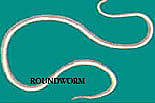HOOKWORMS:
The hookworm is one of the most dangerous parasites because it can cause extensive intestinal bleeding and often anemia. In young, weak, or malnourished animals, hookworms can cause sudden collapse and death. Weight loss, tarry or bloody stool, and diarrhea often occur in pets infested with hookworms. Dogs and cats can become infested with hookworms by ingestion of eggs or larvae, penetration of the skin by larvae, or transmission of larvae from the mother while the fetus is still in the uterus.
Larvae from the hookworm have the ability to penetrate and burrow in human skin resulting in an itchy skin condition known as cutaneous larval migrans. (A person who develops a skin rash after contact with a dog or cat having hookworms should contact a physician). Hookworms can be diagnosed with a fecal exam, and are treated with medication to kill the worms, and correcting the anemia if necessary.
Feces and areas where the dog or cat has been should be cleaned promptly and the stool rechecked. Some heartworm preventatives can also prevent hookworm infections.
WHIPWORMS:
Whipworms are rare in cats, but can cause extensive damage in puppies and adult dogs. They are small, thin worms that live in the large intestine. Whipworms can cause diarrhea, bloody feces and poor general health.
Whipworms are not always easy to diagnose. Three or more fecal tests may need to be done. (The microscopic tests looks for eggs: whipworms lay eggs only occasionally, and it takes 3-4 months after infection until the eggs are passed in stool.) Whipworms tend to be a recurring problem, because they are difficult to eradicate. At least three doses of deworming medication and follow-up fecal tests will be necessary.
TAPEWORMS:
The tapeworm is a parasite found in the intestines of dogs and cats. It consists of a head and a long flat body made up of segments. Segments are passed in the animal's feces, leaving the head attached to the intestine, where it will produce new segments. Tapeworm infestations can cause digestive upsets, poor appetite, poor hair coat and skin and intestinal discomfort.
Tapeworms can be diagnosed by finding the segments in your dog's or cat's feces (the segments look like grains of rice) or in bedding or around the anus. The eggs do not often show up in a fecal test, but having a fecal test done on your pet's stool is a good idea if you see signs of tapeworms. It can show if any other parasites are present, so you can get the appropriate medication.
Tapeworms use the flea as an "intermediate host", which means that your pet has to swallow a flea to become infected. Medication is very effective, but you must also eliminate fleas from the environment, or your pet may get infected again and again. Tapeworms are not passed from pets to humans.
ROUNDWORMS:
Roundworms (ascarids) are commonly found in puppies and kittens; they can become infected by the mother while still in the uterus. They are long, white and coiled, and are sometimes seen in stool or vomit. Roundworms can cause intestinal upset and stunted growth in puppies and kittens. Pets become infected by ingesting roundworm eggs or larvae in contaminated stool or feces. Eggs can remain inactive in soil for years, so re-infestation is common.
Roundworms can be diagnosed by having a fecal test done on your pet's stool. Medication will need to be repeated and the stool rechecked to make sure all of the adults, eggs and larvae are killed. To prevent re-infestation, or infecting other dogs and cats, stool must be disposed of promptly, infected soil should be turned, and any other household pets should be checked for infestation. Human infection is possible but very rare, since eating contaminated soil or stool is necessary for infection. Washing your hands after handling puppies and kittens is recommended, and keeping children away from infected areas or sandboxes is a good idea. Some monthly heartworm preventatives can also prevent roundworms infection.




PARASITES and WORMS
DOGS AND CATS

Consult with your veterinarian about the type of worming program best for your cat or dog.
Web Site Design by S&J Enterprises - Homestead Website Design
Dog and Cat dewormer information.


